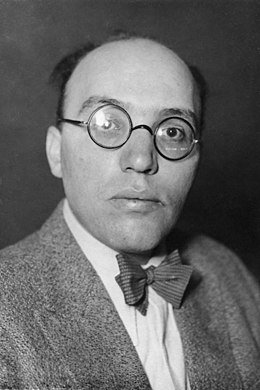Mahagonny
| Aufstieg und Fall der Stadt Mahagonny | |
|---|---|
| Political-satirical opera by Kurt Weill | |

The composer in 1932
|
|
| Translation | Rise and Fall of the City of Mahagonny |
| Librettist | Bertolt Brecht |
| Language | German |
| Premiere | 9 March 1930 Neues Theater, Leipzig |
Rise and Fall of the City of Mahagonny (German: Aufstieg und Fall der Stadt Mahagonny) is a political-satirical opera composed by Kurt Weill to a German libretto by Bertolt Brecht. It was first performed on 9 March 1930 at the Neues Theater in Leipzig.
The libretto was mainly written in early 1927 and the music was finished in the spring of 1929, although both text and music were partly revised by the authors later. An early by-product, however, was the Mahagonny-Songspiel, sometimes known as Das kleine Mahagonny, a concert work for voices and small orchestra commissioned by the Deutsche Kammermusik Festival in Baden-Baden and premiered there on 18 July 1927. The ten numbers, which include the "Alabama Song" and "Benares Song", were duly incorporated into the full opera. The opera had its premiere in Leipzig in March 1930 and played in Berlin in December of the following year. The opera was banned by the Nazis in 1933 and did not have a significant production until the 1960s.
Weill's score uses a number of styles, including rag-time, jazz and formal counterpoint, notably in the "Alabama Song" (covered by multiple artists, notably Ute Lemper, The Doors and David Bowie).
The lyrics for the "Alabama Song" and another song, the "Benares Song" are in English (albeit specifically idiosyncratic English) and are performed in that language even when the opera is performed in its original (German) language. The name of the city itself is a mix between the English and German word for mahogany, "Mahagoni".
It has played in opera houses around the world. Never achieving the popularity of Weill and Brecht's The Threepenny Opera, Mahagonny is still considered a work of stature with a haunting score. Herbert Lindenberger in his book Opera in History, for example, views Mahagonny alongside Schoenberg's Moses und Aron as indicative of the two poles of modernist opera.
...
Wikipedia
